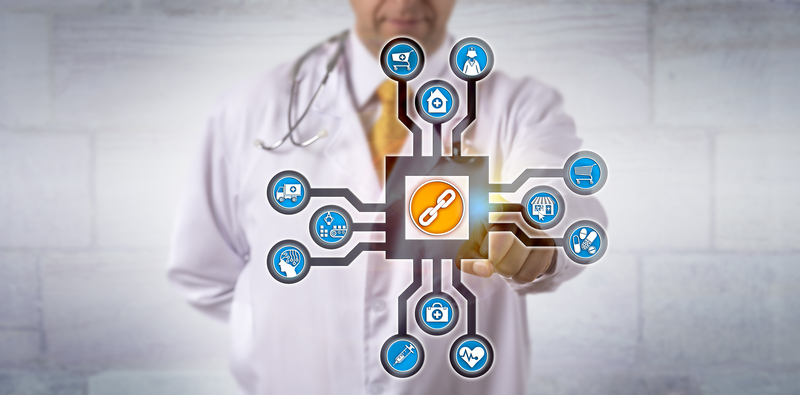Blockchain and Healthcare 101
Blockchain technology is new but has made a considerable impact across many industries. It’s gradually finding its way into the healthcare sector, where it has the potential to improve patient outcomes and productivity. In this article, we’ll explore blockchain technology and its application in the healthcare sector.
Learn more about our Six Sigma training.
What is blockchain?
A blockchain is a decentralized ledger that meticulously records transactions across a network of peer-to-peer (P2P) computers. This unique feature ensures that no single entity controls the process, enhancing security and transparency. The data is shared across a loosely connected network of computers, making it accessible to anyone when required– there’s no gatekeeping.
Blockchain technology is best known for its role in maintaining digital tokens, but it offers much more than that. It’s used to store data securely yet transparently and enable seamless interoperability, which is needed in a sector where many electronic health records (EHR) software providers isolate patients’ data, making it difficult for other medical institutions to integrate into their network without paying sizeable fees.
Blockchain applications in the healthcare sector

Let’s examine some ways blockchain is making significant strides in the healthcare industry:
1. Supply chain transparency
The medical industry operates on a sophisticated and vast supply chain that ensures hospitals, clinics, and other healthcare providers have access to the necessary materials for their operations. However, healthcare providers face a significant challenge in tracking and authenticating medical supplies, particularly in developing markets where counterfeit activities are prevalent. Blockchain technology has the potential to address this issue, offering a reassuring solution for supply chain transparency.
Blockchain technology enables healthcare institutions to accurately track their global supply chains and ensure they receive authentic supplies. For example, FarmaTrust allows companies to track pharmaceutical products on the blockchain and raise alarms if there’s any sign of counterfeiting. It provides transparency into the supply chain, which minimizes the chances of corruption and counterfeiting. This platform brings together different parties in the pharmaceutical supply chain—producers, customers, regulators, and NGOs—and lets each one monitor the others transparently.
2. Electronic health records (EHR)
Record-keeping is a major pain point for healthcare institutions. Electronic health records (EHR) platforms are often too complicated to set up and manage, and third-party integration is often too expensive or cumbersome, making it challenging to transfer patient data from one hospital to another.
A blockchain-based EHR system will be a major improvement for the industry. With such a system, patients can seamlessly transfer their data from one medical provider to another, avoiding costly treatment mistakes resulting from incomplete data. Note that the patients’ sensitive data does not go on the blockchain directly; instead, it is converted to a unique hash function only decodable by the data’s owner. This way, patients can be assured of their privacy while they enjoy seamless data portability.
Many blockchain-based EHR tools are being tested in different countries. The main drawback is the lagging interest from medical institutions, although that’s improving daily.
3. Credential verification
The medical sector relies on credentials, and for a good reason. People want to be treated by legitimate experts who passed through formal educational systems, not people who learned via trial and error.
Medical institutions can use blockchain technology to verify their staff’s credentials and experience. Thanks to blockchain technology, there’ll be no need to pay for expensive background check services when medical institutions can do it faster and more affordably.
4. Insurance and supply chain settlements
Smart contracts allow people to transact seamlessly without centralized parties. Medical institutions can use it to pay suppliers instantly without the friction of going through a third party. Insurance providers can collect premiums from customers and pay hospitals or pharmacy vendors via the blockchain. The blockchain offers high transparency, which reduces pricing and chargeback disputes.
Is the healthcare sector reacting positively towards blockchain?
The healthcare industry is slow-moving, and understandably so; no one moves fast and breaks things when life is at stake. This sector hasn’t adopted blockchain as rapidly as other sectors. However, it’s gradually catching up, with new blockchain solutions being developed daily for the healthcare sector.
You can expect more blockchain applications in the healthcare sector as time passes. Blockchain has massive potential in this industry and is something to watch out for.
SixSigma.us offers both Live Virtual classes as well as Online Self-Paced training. Most option includes access to the same great Master Black Belt instructors that teach our World Class in-person sessions. Sign-up today!
Virtual Classroom Training Programs Self-Paced Online Training Programs






